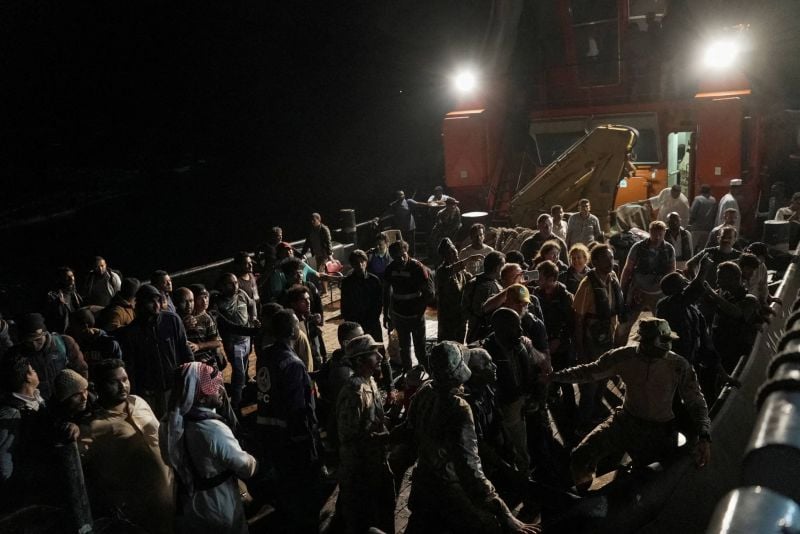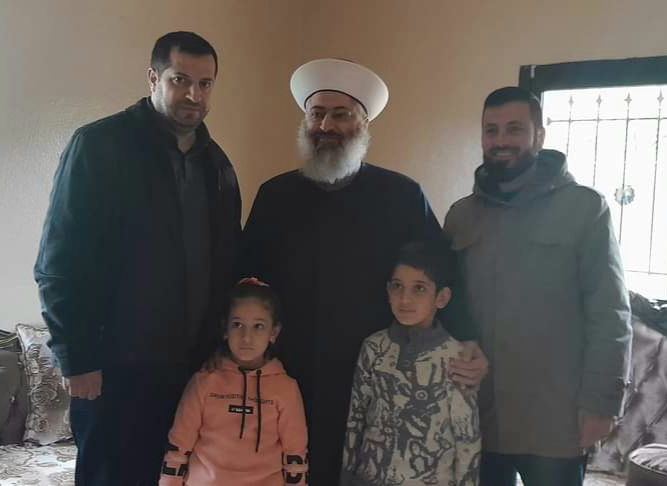
Civilians wait at sea port to be evacuated by Saudi Arabia from Sudan to escape the conflicts, in Port Sudan, Sudan, April 30, 2023. (Credit: Mohammed Benmansour/Reuters)
BEIRUT — Last month, Suhaib Aisha was heading to work at the plastics factory he owns near his home in Khartoum. It was 8 a.m.
Originally from Akkar governorate in Lebanon, Aisha had been living in the Sudanese capital for 13 years with his wife and three young children.
Just before he arrived at the factory, “gunfire and shell explosions erupted without warning,” he tells L’Orient Today.
It was the start of a nightmare that would force Aisha to flee Sudan and — somehow — end up back in his home village of Fneideq, Lebanon with his family members and little else.
Following several days of tensions, fighting in Sudan broke out between the army and paramilitary Rapid Support Forces (RSF) on April 15, soon becoming an all-out war.
Aisha’s neighborhood in the capital was now a deadly frontline.
“I rushed back home to be close to my family and find out what was going on,” he recounts to L’Orient Today. “We started following the news to find out what was happening, and shells began to fall at random, to the right and left. One fell in the building opposite my house, and another in front of it.”
“My family experienced real moments of terror amidst the screams of the children and my wife's breakdown from fear. We took refuge in the corridors of the house away from windows or in somewhat protected areas, fearing stray bullets.”
 Suhaib Aisha (left) and his family back home in Akkar governorate. (Courtesy of: Michel Hallak)
Suhaib Aisha (left) and his family back home in Akkar governorate. (Courtesy of: Michel Hallak)
They decided to flee. They weren’t the only ones. More than 100,000 people have so far been displaced to neighboring countries by the violence, according to the UN’s latest count.
At least 550 people have been killed and 4,926 wounded, according to Sudan’s health ministry. Hospitals have been bombed out of service, sending medical workers fleeing for safety.
Foreign countries are scrambling to evacuate their citizens.
Already 77 Lebanese citizens, as well as Syrians and Palestinians with Lebanese travel documents, have been evacuated by ship and plane, head of Lebanon’s Higher Relief Council Mohammad Kheir tells L’Orient Today from his office in Beirut. The council is in charge of post-disaster aid efforts.
The latest evacuation, on Tuesday, saw three people return to Lebanon via Cyprus and Jordan.
There are no more evacuations of Lebanese citizens, Kheir adds. Fortunately, no Lebanese have yet been killed or injured in the fighting, though it’s unclear how many remain in Sudan, if any.
Aisha, his wife and three kids were among the dozens evacuated in recent days, first over land and then by boat to Jeddah, Saudi Arabia before flying back to Lebanon.
For Hassan Akl Ateyeh, a construction business manager, the wait for evacuation in Khartoum was spent beneath bombs.
Ateyeh moved to Sudan three years ago and, on the eve of the clashes, was living in the capital with his pregnant wife and infant son.
After the fighting started, Ateyeh says Lebanese residents of Khartoum set up a WhatsApp group to coordinate with Lebanon's ambassador to Sudan, Dima Haddad, and get out safely.
But the highway they needed to take to safety was closed, he says, which meant Ateyeh and his family couldn’t take a regular vehicle.
“So we rode a tuk tuk.”
Aisha also faced trouble getting out of the city. There was a designated hotel outside the city where Lebanese families were told to gather so they could evacuate, but he had to cross a dangerous bridge over the Nile to it.
“Crossing the river had become a significant risk, and the thought of leaving the area was risky, but staying in it was even more dangerous,” Aisha says. “So, I chose to risk myself and my family, and we left.”
Both families eventually took a boat to Jeddah alongside dozens of other Lebanese, as well as Syrians and Palestinians. Aisha and his wife and kids ended up back in their village in Akkar, and Ateyeh returned with his family in Beirut.
Now that he’s back home, Ateyeh fears the Khartoum construction business is decimated, and doesn’t have plans to continue his work for now. “I saw videos of the fighting, heavy clashes where one of my warehouses is.”
He’s still in touch with his fellow employees, which include Sudanese, Egyptians and Syrians. “But 90 percent of them have fled,” Ateyeh says.
“That’s roughly 50 families who have now lost their jobs and income – I’m not the only one at the company.”
Aisha, too, says he’s watching the news in Sudan with anxiety. His children, ages seven months to nine years, are still scared. They haven’t restarted school yet and “need time” to settle down after their ordeal.
He’s still keeping in touch with Sudanese factory employees back in Khartoum, Aisha adds.
“I pray for the protection of my friends and those I left behind because the situation is worrisome,” he tells L’Orient Today from his hometown in Akkar.
“I ask God to protect what we own ... I hope that He will protect Sudan and its people.”